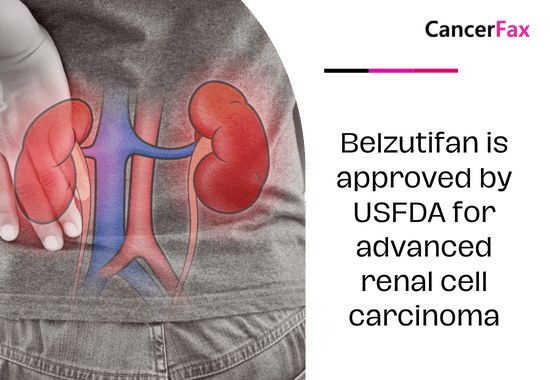The Food and Drug Administration granted approval for belzutifan (Welireg, Merck & Co., Inc.) on December 14, 2023, for patients with advanced renal cell carcinoma (RCC) who have previously received a programmed death receptor-1 (PD-1) or programmed death-ligand 1 (PD-L1) inhibitor and a vascular endothelial growth factor tyrosine kinase inhibitor (VEGF-TKI).
The effectiveness was assessed in LITESPARK-005 (NCT04195750), a study where 746 patients with unresectable locally advanced or metastatic clear cell RCC were randomly assigned to different treatments after progressing following a PD-1 or PD-L1 checkpoint inhibitor and a VEGF-TKI. Participants were randomly assigned in a 1:1 ratio to receive either 120 mg of belzutifan or 10 mg of everolimus once a day. Randomization was categorized based on International Metastatic RCC Database Consortium risk group and the quantity of preceding VEGF-TKIs.
The primary effectiveness measures were progression-free survival (PFS) evaluated by blinded independent central review and overall survival (OS).
Belzutifan showed a statistically significant improvement in progression-free survival (PFS) compared to everolimus, with a hazard ratio of 0.75 (95% CI: 0.63, 0.90) and a one-sided p-value of 0.0008. The Kaplan-Meier curves showed non-proportional risks with comparable median progression-free survival estimates of 5.6 months (95% CI: 3.9, 7.0) in the belzutifan group and 5.6 months (95% CI: 4.8, 5.8) in the everolimus group. Although the OS data were incomplete at the current study, with 59% of fatalities reported, no negative trend was detected. An examination of patient-reported symptoms and functional outcomes indicated that belzutifan was better tolerated than everolimus.
The predominant adverse effects (≥25% occurrence) observed in patients treated with belzutifan included reduced hemoglobin levels, fatigue, musculoskeletal pain, elevated creatinine levels, decreased lymphocyte count, elevated alanine aminotransferase levels, reduced sodium levels, elevated potassium levels, and increased aspartate aminotransferase levels.
The suggested belzutifan dosage is 120 mg taken orally once a day until disease progression or intolerable toxicity.
Dr. Nishant Mittal is a highly accomplished researcher with over 13 years of experience in the fields of cardiovascular biology and cancer research. His career is marked by significant contributions to stem cell biology, developmental biology, and innovative research techniques.
Research Highlights
Dr. Mittal's research has focused on several key areas:
1) Cardiovascular Development and Regeneration: He studied coronary vessel development and regeneration using zebrafish models1.
2) Cancer Biology: At Dartmouth College, he developed zebrafish models for studying tumor heterogeneity and clonal evolution in pancreatic cancer.
3) Developmental Biology: His doctoral work at Keio University involved identifying and characterizing medaka fish mutants with cardiovascular defects.
4) Stem Cell Research: He investigated the effects of folic acid on mouse embryonic stem cells and worked on cryopreservation techniques for hematopoietic stem cells.
Publications and Presentations
Dr. Mittal has authored several peer-reviewed publications in reputable journals such as Scientific Reports, Cardiovascular Research, and Disease Models & Mechanisms1. He has also presented his research at numerous international conferences, including the Stanford-Weill Cornell Cardiovascular Research Symposium and the Weinstein Cardiovascular Development Conference.
In summary, Dr. Nishant Mittal is a dedicated and accomplished researcher with a strong track record in cardiovascular and cancer biology, demonstrating expertise in various model systems and a commitment to advancing scientific knowledge through innovative research approaches.
- Nishant Mittal (PhD)https://cancerfax.com/author/nishantm/
- Nishant Mittal (PhD)https://cancerfax.com/author/nishantm/
- Nishant Mittal (PhD)https://cancerfax.com/author/nishantm/
- Nishant Mittal (PhD)https://cancerfax.com/author/nishantm/



